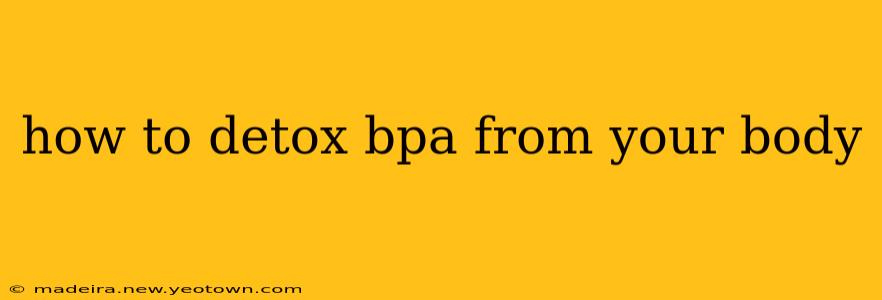How to Detox BPA from Your Body: A Holistic Approach
BPA, or bisphenol A, is a chemical found in many everyday products, from plastic food containers to the lining of cans. While the body processes and eliminates BPA relatively quickly, prolonged exposure to high levels can be concerning. This article explores various strategies to minimize your BPA intake and support your body's natural detoxification processes. It’s important to note that there is no single “detox” that magically removes BPA, but rather a multifaceted approach focusing on prevention and supporting your body's own elimination mechanisms.
This journey started for me when I read a concerning article about BPA leaching into my baby's food from certain plastic containers. That's when I decided to take a proactive approach and research ways to minimize our exposure. It wasn't easy at first, but the peace of mind was worth it. Let's explore some key strategies together.
1. Minimize BPA Exposure: The Foundation of Detoxification
This is the most crucial step. Before we even talk about supporting your body's detox pathways, we need to drastically reduce the amount of BPA entering your system in the first place.
-
Choose BPA-free products: Look for products labeled "BPA-free" when purchasing plastic containers, water bottles, and food storage items. Remember, "BPA-free" doesn't necessarily mean completely free of all harmful chemicals, but it's a significant step in the right direction.
-
Avoid canned foods: The lining of many canned foods contains BPA. Opt for fresh, frozen, or foods packaged in glass jars whenever possible.
-
Limit your use of polycarbonate plastics: These plastics often contain BPA. Look for alternatives like glass, stainless steel, or BPA-free plastics.
-
Avoid heating food in plastic containers: Heat can accelerate BPA leaching. Always use glass or microwave-safe containers when reheating food.
2. What are the best foods to eat to help your body get rid of BPA?
A diet rich in specific nutrients can support your body's natural detoxification processes. This isn't a magical "BPA-cleansing" diet, but rather focusing on overall health.
-
Cruciferous vegetables: Broccoli, cauliflower, Brussels sprouts, and kale contain compounds that support liver detoxification.
-
Fiber-rich foods: Fiber helps bind to toxins, aiding in their elimination through the digestive system. Include plenty of fruits, vegetables, and whole grains in your diet.
-
Antioxidant-rich foods: Antioxidants help protect cells from damage caused by toxins. Load up on berries, dark leafy greens, and other colorful fruits and vegetables.
-
Foods rich in glutathione: Glutathione is a powerful antioxidant that plays a vital role in detoxification. Foods like avocados, asparagus, and spinach are good sources.
3. Does drinking more water help remove BPA from your body?
Yes, staying well-hydrated is crucial for overall health and supports detoxification. Water helps flush toxins out of your body through urine. Aim for at least eight glasses of water daily.
4. What supplements can help detoxify BPA?
While there's no scientific consensus on specific supplements for BPA detoxification, certain nutrients are important for supporting overall liver health and detoxification processes. Always consult a healthcare professional before taking any supplements, particularly if you have pre-existing health conditions. Examples include milk thistle, which supports liver function, and turmeric, known for its anti-inflammatory properties.
5. Are there any specific lifestyle changes that can help detoxify BPA?
Beyond diet and hydration, incorporating these lifestyle changes can support your body's overall detoxification capabilities:
-
Regular exercise: Exercise stimulates circulation and helps eliminate toxins.
-
Adequate sleep: Sleep is crucial for cellular repair and detoxification processes.
-
Stress management: Chronic stress can impair detoxification pathways. Practice relaxation techniques like yoga, meditation, or deep breathing exercises.
-
Support Liver Health: A healthy liver is key to detoxification. Avoid excessive alcohol consumption, and protect your liver through proper nutrition.
The journey to minimizing BPA exposure and supporting your body's detoxification pathways is ongoing. It's about making gradual, sustainable changes that improve your overall well-being. Remember, consistency is key. By combining these strategies, you can significantly reduce your BPA exposure and promote a healthier, more vibrant you. Always consult with your doctor or a qualified healthcare professional for personalized advice, especially if you have concerns about high BPA exposure or underlying health conditions.

